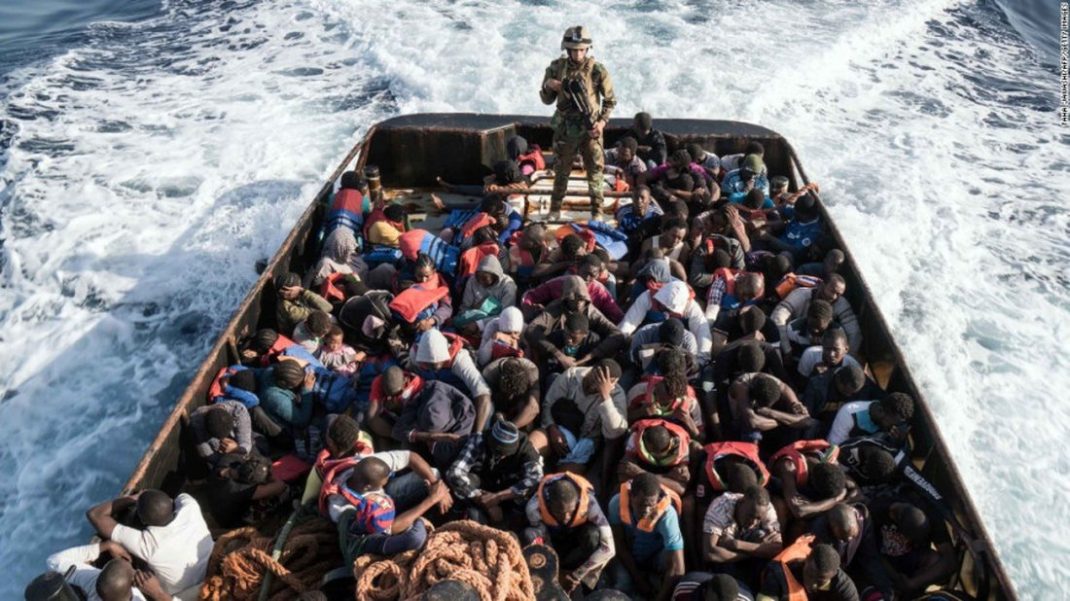By Mark Kersten
 In the midst of Libya’s uprising and civil war, Idriss Déby issued a stern warning: “beware of opening Pandora’s box”.
In the midst of Libya’s uprising and civil war, Idriss Déby issued a stern warning: “beware of opening Pandora’s box”.
As Alex de Waal has explained, the Chadian president’s words of caution were the result of concerns over the repercussions of a destabilized Libya.
Today, some eight years after the Arab Spring, Libyan civil war, and the concomitant demise of the regime of Gaddafi, Pandora’s box is wide open in Libya.
While it may be foolhardy to compare the crimes of 2011 to those perpetrated since, the years following the Libyan civil war have been stained by severe bouts of violence, a humanitarian tragedy off the shores of the country, the virulent spread of human trafficking and associated crimes, and virtually full-fledged impunity for all of the above.
Is there a place for the International Criminal Court (ICC) in all of this?
It is not uncommon to hear calls for the ICC to intervene further in Libya. Dozens of organizations, lawyers, and NGOs regularly implore the Court to investigate ongoing violence in Libya.
The latest comes from the UN Mission in Libya (UNSMIL), which suggestedthat recent attacks on Tripoli’s Mitiga airport as well as related unrest should be probed by the ICC.
Others have called on various specific actors to be investigated, including Khalifa Haftarfor atrocities committed his self-styled Libyan National Army (LNA) as well as the European Union for its alleged rolein crimes against humanity committed against migrants seeking refuge in Europe (EU) via the Mediterranean.
The ICC is already active in Libya and has been since 2011 when the United Nations Security Council referredthe situation there to the Court.
The Office of the Prosecutor has taken the view that that the original referral by the Council means that the Court continues to have jurisdiction over Libya (and therefore that it was not limited to the 2011 civil war and its immediate aftermath).
In 2011, the ICC issued three warrants: for Gaddafi, his son Saif al-Islam Gaddaif, and Abdullah al-Senussi.
ICC chief Prosecutor Fatou Bensouda has also issued arrest warrants since 2011, including one against Mahmoud al-Werfalli for the extra-judicial murders of LNA prisoners – which were filmed and disseminated on social media.
If measured by the achievement of justice in Libya, The Hague, or frankly anywhere, the ICC’s record in Libya looks bleak. No warrant issued by the Court has been enforced.
Abdullah al-Senussi and Saif al-Gaddafi (via video) were prosecuted in Tripoli and sentenced to death, but their prosecutions are widely seen as a farce, with neither enjoying anything close to due process.
Regardless of this reality, ICC judges determined in 2013 and 2014 that the case against al-Senussi was inadmissible.
Despite calls to revisit this ruling – something that the ICC Prosecutor can request – this has not been done. The whereabouts of Saif is the subject of intense speculation.
Some reportssay he is preparing to run for the country’s presidency, but there have been no confirmed public sightings of him in at least three years.
Al-Werfalli and another individual indicted by the ICC, Al-Tuhamy Mohamed Khaled, Muammar Gaddafi’s former security chief, remains at large.
The apparent impotency of the ICC to achieve accountability for international crimes or to deter their commission has not stifled calls for additional and increased ICC activity. So, what, if anything, can be hoped for from the Court in Libya?
For individuals like al-Werfalli and Khaftar, the likelihood of the ICC affecting their behaviour is low.
This should be clear from the fact that not only did Werfalli and his henchmen disseminate their crimes on social media, but they have done so since, resulting in a second warrant being issued.
Despite periodic suggestions that Werfalli would be detained and investigated by the LNA, this has not transpired; on the contrary, his temporary detention in early 2018 provoked an outpouringof protest from his supporters and his release without charge.
Only if and when Werfalli falls out with Haftar and only and if and when Haftar views The Hague, rather than the gallows, as his preferred destination for Werfalli, will the ICC get its man.
With respect to the European Union, the ICC may have a chance to affect the EU’s behaviour and undermine the deprave “deterrence” policies.
Those policies contribute to thousands of migrants perishing and those who are herded back to Libya being subject to horrendous abuse, including torture, sexual and gender-based violence, human trafficking, and enslavement.
The bombing on the Tajoura migrant camp, which some viewas the “consequence” of Libya’s and the EU’s migration policies, should only galvanize scrutiny of Brussels’ policies.
There is a general sense that the behaviour of wanton militias and bodies like the Libyan Coast Guard won’t be affected unless the policies of the EU change first.
However, and irrespective of the validity of doing so, the ICC is unlikely to actually investigate any individuals within the European Union for the situation facing migrants in the Mediterranean.
There are jurisdictional hurdles that would need to be overcome. More generally, the Court is not in a position of strength and is ‘exposed’ on many fronts.
At the same time, the ICC works closely with a network of European states to address human trafficking in Libya and the Prosecutor is unlikely to want to threaten those relations.
Moreover, many proponents of the ICC want it to do less with the resources it has, rather than aspire to do more.
In short, it’s unlikely to go after some of its primary supporters (and funders) in Europe, at least for the foreseeable future.
The reason that the ICC could potentially have a positive impact on European behaviour is precisely because the European Union and European states more generally aresupportive of the ICC.
As (by and large) liberal democracies, they may indeed be more likely to be swayed by affectations of the Court than other states.
If through a preliminary examination or strategic response to various filings at the Court, the Prosecutor and ICC can shed light and increase attention on the EU’s relations with entities like the Libyan Coast Guard and various militias that are funded by Brussels and which regularly violate the rights of migrants, then it could potentially change policy and deter further crimes.
Such an outcome would be welcome. But it would be anything but easy and is likely to have downstream consequences.
It is worth recalling that, prior to 2011, European states worked very closelywith Gaddafi to prevent migrants from reaching Europe.
They had no apparent qualms in doing so. When the regime fell and instability made it more difficult to curtail migration via the Mediterranean, the EU turned to ICC indicteeand Sudanese president Omar al-Bashir to help keep the lid on migration flows in the region.
One should be under no illusion that states will hesitate to cooperate with, and give large sums of money to, violent regimes if they promise to help stem migration to Europe – even if doing so makes them complicit in brutal tactics and the commission of mass atrocities.
While it may be a long shot and expectations need to be tempered, some ICC scrutiny of EU policies could still yield positive impacts on EU policy.
In an indirect manner, that could also be the way to ultimately affect indigenous actors committing atrocities in Libya.
If ICC activity helped to change EU behaviour and end Europe’s relationship with criminal organizations and militias, this could signal to those players committing atrocities that they too should be worried.
It could pierce the sense of invincibility from accountability that the Werfallis of the world evidently feel.
Pandora’s box remains wide-open in Libya. Could ICC justice help to close it?
Only time will tell, but it’s almost certainly worth a shot.
***
Mark Kersten is a consultant at the Wayamo Foundation, a Senior Research at the Munk School of Global Affairs, and a law student at McGill University Law School. He is also author of the book, ‘Justice in Conflict – The Effects of the International Criminal Court’s Interventions on Ending Wars and Building Peace’ (Oxford University Press, 2016).
___________




